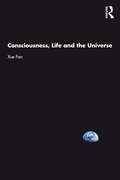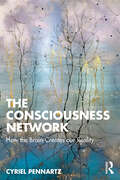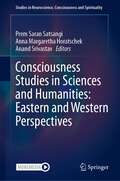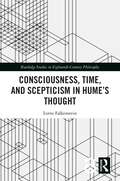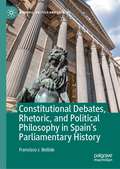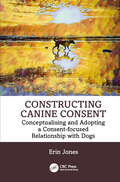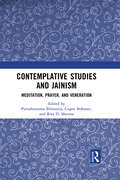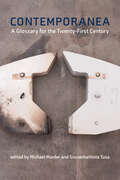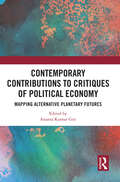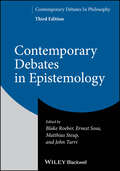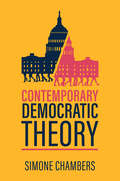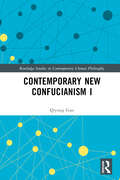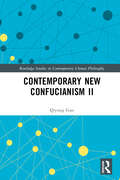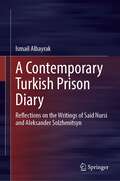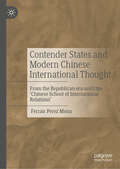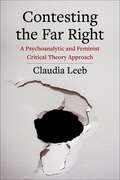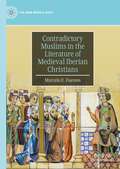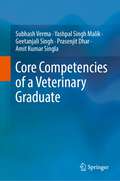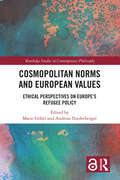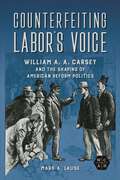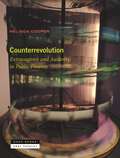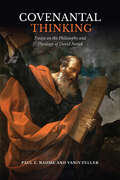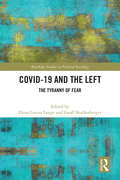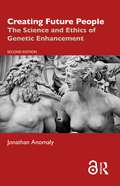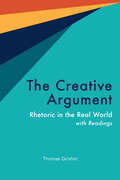- Table View
- List View
Consciousness, Life and the Universe
by Xue FanWhat is consciousness? What is life? What is the universe? This book explores these three interconnected questions, providing deep insights into the past, present and future of consciousness research. Consciousness, Life and the Universe builds a unified view of consciousness across biological, chemical and physical scales, tracing the natural connections from the infinitesimally small to the infinitely big; from quantum fields and elementary particles to molecules, cells and living organisms to the cosmos; from the evolution of life to the evolution of the universe and to the future of humanity. The book provides a unified framework for future consciousness studies and identifies the scientific and technological approaches that are essential for further understanding consciousness. Through this pioneering research approach, the book clearly redefines consciousness and life and conceives a plausible view of the origin and nature of the universe. This is a must-read for students and researchers in consciousness studies, cognitive psychology, cognitive science and neuroscience, as well as anyone interested in the biological and physical basis of consciousness and the history and evolution of consciousness research.
The Consciousness Network: How the Brain Creates our Reality
by Cyriel PennartzWhat is the relationship between consciousness and our brain? Are they one and the same? Who are we really? The Consciousness Network presents a novel account of one of the greatest scientific challenges of the twenty-first century: understanding the connection between brain and mind.The book explores remarkable cases of patients who demonstrate how our impression of reality is created by the brain. Age-old questions about dreams, colour perception, phantom sensations and hallucinations are illuminated by surprising discoveries from the latest brain research. How does consciousness differ from memory, emotions and behaviour? How did it develop during the evolution of life on earth, and does it serve a purpose? Does the brain leave room for free will? In this unique blend of philosophy, history, psychology and neuroscience, Cyriel Pennartz breaks new ground by presenting an original theory of brain and mind, substantiated by brain research in patients and healthy people. This theory, inspired by the seventeenth-century philosopher Spinoza, goes significantly deeper than current thinking based on computer models or artificial intelligence.The Consciousness Network is essential reading for students working at the interface of neuroscience, cognitive psychology, philosophy of mind and cognitive science, as well as anyone interested in consciousness and the brain.
Consciousness Studies in Sciences and Humanities: Eastern and Western Perspectives (Studies in Neuroscience, Consciousness and Spirituality #8)
by Prem Saran Satsangi Anna Margaretha Horatschek Anand SrivastavThis book presents consciousness models from Eastern and Western perspectives that accommodate current scientific research in the natural sciences and humanities, from neurological experiments through philosophical enquiries to spiritual approaches. It offers up to date research from key disciplines in consciousness studies ranging from neurology, quantum mechanics, algorithmic science, mathematics, and astrophysics to literary studies, philosophy, and (comparative) theology. The volume examines the dichotomy between Western and Eastern perceptions of consciousness – where consciousness is perceived as brain activity by Western scientists, and as a divine presence by various religions, especially in the East. The essays contextualize each other and reciprocally illuminate the potential and limits of the respective approaches. The texts aim at a transdisciplinary and transcultural exchange of ideas in consciousness studies and address a readership from interested lay-readers to experts of the field. The volume is of interest to researchers of consciousness studies.
Consciousness, Time, and Scepticism in Hume’s Thought (Routledge Studies in Eighteenth-Century Philosophy)
by Lorne FalkensteinDavid Hume’s philosophical work presents the reader with a perplexing mix of constructive accounts of empirically guided belief and destructive sceptical arguments against all belief. This book reconciles this conflict by showing that Hume intended his scepticism to be remedial. It immunizes us against the influence of “unphilosophical” causes of belief, determining us to proportion our beliefs to the evidence.In making this case, this book develops Humean positions on topics Hume did not discuss in detail but that are of interest to contemporary philosophers: consciousness and the unity of consciousness, temporal experience, visual spatial perception, the experience of colour and other qualia, objective experience, and spatially extended minds. It also challenges currently accepted interpretations of Hume’s views on the finite divisibility of space and time, vacuum, the duration of unchanging objects, and identity over time. It deals with criticisms of Hume that were raised by his contemporaries, notably by Thomas Reid, draws attention to earlier seventeenth‑ and eighteenth‑century work that has bearing on the interpretation of Hume’s thought, and compares Hume’s achievements with those of later nineteenth‑century psychologists and philosophers.Consciousness, Time, and Scepticism in Hume’s Thought will appeal to scholars and advanced students interested in Hume, history of philosophy, and early modern theories of perception, time, and consciousness.
Constitutional Debates, Rhetoric, and Political Philosophy in Spain’s Parliamentary History (Rhetoric, Politics and Society)
by Francisco J. BellidoThis book examines the conceptual contributions of constituent representatives in Spain during the nineteenth and twentieth centuries. The Spanish Parliament has been the stage for the political modernisation of the country. Constitutional debates have historically led to the gradual acknowledgement and broadening – usually unevenly – of citizens’ rights. At the same time, constitutional debates have created opportunities to design institutions and settle legal mechanisms to enforce rights and distribute state resources. The book identifies and analyses rhetorical and conceptual innovations produced in such debates from a historical perspective.
Constructing Canine Consent: Conceptualising and adopting a consent-focused relationship with dogs
by Erin JonesThe concept of canine consent is far more than simply a buzzword in modern dog training practices. In its current form, consent is a distinctly human concept, designed by humans and for humans. Looking beyond species boundaries can help us not only consider concepts of canine consent and autonomy, but it can also help us to apply these concepts in our everyday interactions with dogs, which is fundamental for any professional working with dogs as well as for everyday dog caregivers. This canine-indexed definition of consent includes a model of five major categories: Touch/interaction-based consent, cooperative care using learned consent behaviours, activity consent, consent-based learning, and substitutive consent. These categories involve a two-way communication system, integration of salient choices, teaching consent behaviours and incorporating existing training protocols that adhere to the Humane Hierarchy of best practices, and an evaluation of dependent decision-making in extenuating circumstances. This book aims to merge the existing literature and new understandings about canine consent to paint a complete picture. It will challenge the current expectations of dogs and dog behaviour in our society with an intention of considering their perspectives, experiences, and emotional needs. It will be important reading for veterinary professionals, dog trainers and behaviourists, those involved in work with therapy dogs, and anybody working with or caring for dogs.
Contemplative Studies & Jainism: Meditation, Prayer, and Veneration
by Purushottama Bilimoria Cogen Bohanec Rita D. ShermaThis volume is one of the first wide-ranging academic surveys of the major types and categories of Jain praxis. It covers a breadth of scholarly viewpoints that reflect both the variegation in terms of spiritual practices within the Jain traditions as well as the Jain hermeneutical perspectives, which are employed in understanding its rich diversity. The volume illustrates a complex and nuanced understanding of the multifaceted category of Jain religious thought and practice. It offers a rare intrareligious dialogue within Jain traditions and at the same time, significantly broadens and enriches the field of Contemplative Studies to include an ancient, ascetic, non-theistic tradition. Meditation, yoga, ritual, prayer are common to all Indic spiritual traditions. By investigating these diverse, yet overlapping, categories one might obtain a sophisticated understanding of religious traditions that originally emerged in South Asia. Essays in this book demonstrate how these forms of praxis in Jainism, and the philosophies that anchor those practices, are interrelated, and when brought into dialogue, help to foster new tools for understanding a complex and variegated tradition such as Jain Dharma. This book will be useful to scholars and researchers of religious and theological studies, contemplative studies, Jain studies, Hindu studies, consciousness studies, Yoga studies, Indian philosophy and religion, sociology of religion, philosophy of religion, comparative religion, and South Asian studies, as well as general readers interested in the topic.
Contemporanea: A Glossary for the Twenty-First Century
by Michael Marder Giovanbattista TusaA groundbreaking, multidisciplinary collection that rethinks our present moment and anticipates the key concepts that will shape and direct the twenty-first century.Contemporanea is a nascent lexicon for the twenty-first century edited by seasoned philosophers and authors Michael Marder and Giovanbattista Tusa. The collection showcases perspectives from a range of noteworthy thinkers in philosophy, ecology, and cultural studies, as well as artists, from across the globe, including Slavoj Zizek, Timothy Morton, Denise Ferreira Da Silva, and Vandana Shiva, who each describe what they anticipate will be the concepts shaping the trajectory of this century—everything from the world state to the nuclear taboo, automation to Teslaism, plant sexuality to arachnomancy, and ecotrauma to resonances, to name a few.This century, as the editors explain, has to date grounded itself in the debris of the preceding century, whose revolutions and struggles failed to transform our time: post-colonialism, post-fascism, and post-liberalism have morphed into neocolonialism, neoliberalism, and neofascism, often combined in a previously unimaginable mix. And, just as the political developments at the beginning of the twenty-first century revived and reshuffled those of the preceding epoch, so too have philosophical trends sought to breathe fresh life into the stillborn -isms of the past—realism, vitalism, logicism, materialism, empiricism, criticism—adding the adjective &“new&” and sometimes &“radical&” before them. To articulate a different future, another language is needed. And, to develop another language, one needs to develop fresh concepts, including the concepts proposed in this collection.ContributorsMieke Bal, Claudia Baracchi, Amanda Boetzkes, Erik Bordeleau, Anita Chari, Emanuele Coccia, Valentina Desideri, Roberto Esposito, Filipe Ferreira, Denise Ferreira da Silva, Claire Fontaine, Graham Harman, Yogi Hale Hendlin, Ranjit Hoskote, Cymene Howe, Daniel Innerarity, Joela Jacobs, Ken Kawashima, Sabu Kohso, Bogna Konior, Brandon LaBelle, Anna Longo, Artemy Magun, Michael Marder, Michael Marder, Jason Bahbak Mohaghegh, Timothy Morton, Mycelium, Jean-Luc Nancy, Bahar Noorizadeh, Kelly Oliver, Uriel Orlow, Richard Polt, Marcia Sá Cavalcante Schuback, Tomás Saraceno, Vandana Shiva, Anton Tarasyuk, Anaïs Tondeur, Giovanbattista Tusa, Sjoerd van Tuinen, Santiago Zabala, Zahi Zalloua, Slavoj Žižek
Contemporary Critiques of Political Economy: Mapping Alternative Planetary Futures
by Ananta Kumar GiriThis book analyses contemporary critiques of political economy and highlights the challenges to rethinking contemporary discourses and practices. It carries out a multi-pronged critical and transformative dialogue involving political economy, moral economy, moral sociology, moral anthropology, and spiritual ecology. The authors discuss diverse themes such as the relationship between consciousness and society, the dialogue between Karl Marx and Carl Gustav Jung, a critical sociology of morality and property relations, moral and political economy of the Indigenous peoples and a critique of modern civilization, economic evaluation, as well as alternative traditions of thinking in Marx, Thoreau, Gandhi, J.C. Kumarappa, Rammanohar Lohia, B.R. Ambedkar and Jayaprakash Narain. A unique transdisciplinary text, the book brings together authors and approaches from both the Global North and South. It will be indispensable to students, research scholars and teachers of humanities and social sciences in such fields as economics, sociology, philosophy, cultural studies and development studies.
Contemporary Debates in Epistemology (Contemporary Debates in Philosophy)
by Blake Roeber Ernest Sosa Matthias Steup John TurriThe perfect introduction to contemporary epistemology, completely overhauled for its third edition In Contemporary Debates in Epistemology, pairs of specially commissioned essays defend opposing views on some of today’s most compelling epistemological issues and problems. Offering a unique blend of accessibility and originality, this timely volume brings together fresh debates on hotly contested issues to provide readers with the opportunity to engage in comparative analysis of constantly changing and developing epistemological concepts. Now in its third edition, Contemporary Debates in Epistemology features up-to-date coverage of the latest developments in the field. Entirely new essays examine questions of epistemic normativity and knowledge, the relationship between belief and credence, the possibility of internalist epistemology, epistemic instrumentalism, norms of assertion, the use of thought experiments in epistemology, and more. Presents a rigorous yet accessible introduction to the major topics in contemporary epistemology Contains head-to-head chapters offering forceful advocacy of opposing philosophical stances Focuses on core areas of epistemology Uses a lively debate format that sharply defines the issues and encourages further discussion All-new chapters provide fully updated coverage of new and emerging topics in epistemologyPart of the Wiley-Blackwell Contemporary Debates in Philosophy series, Contemporary Debates in Epistemology, Third Edition, remains an essential resource for advanced undergraduate philosophy majors, graduate students in philosophy, and epistemologists who want to keep current with contemporary epistemological debates.
Contemporary Democratic Theory
by Simone ChambersIs democracy worth saving? Responding to the erosion of democracy, philosophical debates have pivoted from analyzing the best forms of democracy to questioning what is so valuable about democracy to begin with, how we can save it, and whether it is indeed worth saving. Contemporary Democratic Theory charts this pivot and surveys the most important new developments in the philosophical, theoretical, and normative examination of the concept of democracy. Comparisons that dominated 20th century democratic theory - between direct democracy, participatory democracy, deliberative democracy, and agonistic democracy - are in the 21st century giving way to comparisons between democracy and its challengers: epistocracy, technocracy, meritocracy, oligarchy, and autocracy. Philosophical interest in the canonical figures of democratic theory like Aristotle, Rousseau and Mill is being eclipsed by damage control in the face populism, sinking trust in democratic institutions, failing political parties, and the spread of misinformation.Overarching epochal forces of crisis and threat are pushing democratic theory in new directions and towards new ideas. This refreshing and authoritative text identifies, explains, and evaluates the new directions taken by contemporary democratic theory in challenging times.
Contemporary New Confucianism I (Routledge Studies in Contemporary Chinese Philosophy)
by Qiyong GuoAs the first volume of a two-volume seminal work on contemporary New Confucianism in China, this book charts the development of this intellectual trend and examines four leading thinkers of this intellectual movement in the 20th century. Contemporary New Confucianism refers to the Confucianism or Confucian thought that has emerged in China since the 1920s and that seeks to revive Confucian spirituality in a changing society. This volume first analyzes the cultural context, logical approach, major themes, and problems of New Confucianism before delving into the four leading figures, namely Liang Shumin, Xiong Shili, Ma Yifu, and Qian Mu. The chapter on Liang Shumin analyzes his concept of will, his arguments on Confucian moral ideals, and his theory of culture. It then discusses Xiong Shili's contribution to the philosophical metaphysics of New Confucianism. The following chapter on Ma Yifu examines his theory of the mind, nature, and the six arts. The final chapter on Qian Mu presents his views on nationality, history, and the Chinese classics. This title will appeal to scholars and students of modern and contemporary Confucianism, intellectual history, philosophy and thought of contemporary China, and comparative philosophy.
Contemporary New Confucianism II (Routledge Studies in Contemporary Chinese Philosophy)
by Qiyong GuoAs the second volume of a two-volume seminal work on contemporary New Confucianism in China, this book focuses on six leading thinkers of this intellectual movement in the 20th century. Contemporary New Confucianism refers to the Confucianism or Confucian thought that has emerged in China since the 1920s, which aims to revive the spirituality of Confucianism in a changing society. This volume introduces the philosophical thought of Zhang Junmai, Feng Youlan, He Lin, Fang Dongmei, Tang Junyi, and Mou Zongsan, including Zhang's political philosophy and comparative philosophy, Feng's transformation of Chinese philosophy, He's idea of culture and "spirit-only idealism," Fang's comparative philosophy, Tang's idea of moral self and theory of human spiritual realms, and Mou's new ontology for Confucianism. It analyzes their divergences and the contemporary relevance of their thought in terms of revisiting and transforming traditional Chinese philosophy and reconciling Chinese and Western traditions. This title will appeal to scholars and students of modern and contemporary Confucianism, intellectual history, philosophy and thought of contemporary China, and comparative philosophy.
A Contemporary Turkish Prison Diary: Reflections on the Writings of Said Nursi and Aleksander Solzhenitsyn
by Ismail AlbayrakThis book explores the religious experiences of two notable figures who endured severe trials under authoritarian regimes: Bediuzzaman Said Nursi (1877–1960) within the Islamic tradition, and Aleksander Solzhenitsyn (1918–2008) within the Russian Orthodox Christian tradition. Against the tumultuous backdrop of the twentieth century’s spiritual, social, political, and intellectual upheavals, both Nursi and Solzhenitsyn grappled with immense hardships because of their beliefs. Despite immense tribulations, both individuals demonstrated unwavering faith and resilience in the face of adversity, continuing their scholarly and literary activities. The current study centers on the dichotomy of spiritual confinement and expansiveness, illustrating how people can experience spiritual distress even without physical restraints. It explores the historical and conceptual aspects of imprisonment within Christian and Muslim perspectives, explores the reasons for Nursi and Solzhenitsyn's incarceration, examines their coping mechanisms in the face of hardship, and underscores the role of faith and spirituality. The author integrates personal experiences, particularly his own incarceration during the aftermath of the 2016 Turkish staged coup attempt, within the context of the narratives of Nursi and Solzhenitsyn. The book addresses court proceedings, release, departure from Turkey, and resettlement in Australia. Throughout, the author draws parallels between their own observations and those of Nursi and Solzhenitsyn, contributing to the broader discourse on individual spirituality and collective consciousness. The book offers insights into spiritual resilience in the face of adversity, utilizing the lives of these figures to illuminate shared human experiences. A unique collation of personal narration and scholarly reflection, it is relevant to academics and students in history, political science, sociology, Islamic and Middle Eastern studies, and to social scientists researchingthe phenomenon of exile and prison in different countries across the world. It also speaks to the work of activists and policymakers in human rights.
Contender States and Modern Chinese International Thought: From the Republican era until the ‘Chinese School of International Relations’
by Ferran Perez MenaThis book contends that the development of modern Chinese international thought has been profoundly shaped by the distinctive nature of the Chinese state as a contender state and its global positioning since 1912. The argument posited demonstrates that, notwithstanding the varied perspectives on the 'international' held by Chinese intellectuals throughout the 20th century, there exist commonalities across the periods analyzed in this book. In essence, the book emphasizes that the shared elements influencing the production of modern Chinese international thought do not derive from a unified cultural Chinese identity but rather stem from China's evolving geopolitical position in the modern world.
Contesting the Far Right: A Psychoanalytic and Feminist Critical Theory Approach (New Directions in Critical Theory #88)
by Claudia LeebWhy have so many people responded to the insecurity, exploitation, alienation, and isolation of precarity capitalism by supporting the far right? In this timely book, Claudia Leeb argues that psychoanalytic and feminist critical theory illuminates how economic and psychological factors interact to produce this extreme political shift.Contesting the Far Right examines right-wing recruitment tactics in the United States and Austria, where people discontented with the status quo have turned to far-right parties and movements that further cement capitalism’s adverse effects. Leeb contends that Freudian psychoanalytic theory and early Frankfurt School Critical Theory provide analytical tools to explain this apparent contradiction in psychological terms. Living under precarity capitalism generates feelings of failure and anxiety, which people experience as non-wholeness, because it has become difficult if not impossible to live up to the fetish of economic, interpersonal, and bodily success, and the far right preys on such feelings. Its psychologically oriented propaganda tactics produce the illusion of wholeness and a positive sense of self while leaving the socioeconomic conditions that cause people’s suffering intact. At the same time, they remove the inhibitions that keep people’s repressed aggression and racist and sexist attitudes in check. To demonstrate the workings of this process, Leeb compares cases including Trump and the alt-right in the United States and the Freedom Party and the identitarian movement in Austria. At once theoretically rich and politically engaged, this book also offers ways to resist the far right and counter the psychological appeal of its propaganda techniques.
Contradictory Muslims in the Literature of Medieval Iberian Christians (The New Middle Ages)
by Marcelo E. FuentesThis book argues that literary and historiographical works written by Iberian Christians between the twelfth and sixteenth centuries promoted contradictory representations of Muslims in order to advocate for their colonization through the affirmation of Christian supremacy. Ambivalent depictions of cultural difference are essential for colonizers to promote their own superiority, as explained by postcolonial critics and observed in medieval and early modern texts in Castilian, Catalan, and Portuguese, such as the Cantar de mio Cid, Cantigas de Santa Maria, Llibre dels fets, Estoria de España, Crónica geral de 1344, Tirant lo Blanch, and Os Lusíadas. In all these works, the contradictions of Muslim enemies, allies, and subjects allow Christian leaders to prevail and profit through their opposition and collaboration with them. Such colonial dynamics of simultaneous belligerence and assimilation determined the ways in which Portugal, Spain, and later European powers interacted with non-Christians in Africa, Asia, and even the Americas.
Core Competencies of a Veterinary Graduate
by Subhash Verma Yashpal Singh Malik Geetanjali Singh Prasenjit Dhar Amit Kumar SinglaThis book is an essential guide for veterinarians, veterinary faculty and policymakers for understanding the core competencies of a fresh veterinarian. The book briefly covers competencies in preclinical, paraclinical, and clinical subjects including anatomy, physiology, biochemistry, veterinary jurisprudence, animal management & welfare including nutrition and breeding, infectious and non-infectious diseases, disease epidemiology, diagnosis, and treatment, prevention, control and zoonoses, surgical and other clinical interventions. The book further includes other competencies, including biologicals, anti-mortem, and post-mortem inspection, certifications, applied one health aspects, review and analysis of scientific evidence, international trade and regulations, and organization of veterinary services. It also highlights the importance of effective communication, interpersonal skills, record keeping and management of a small veterinary hospital, health informatics, etc. The book breakdowns the must-have competencies of a global veterinarian into different topics and subtopics for easy comprehension and further learning. It enables the professional standard-setting & regulatory bodies and academicians in improved curricula designing and implementation and more importantly tries to bring uniformity in day one veterinary graduates’ competencies globally, enhancing the movement and employability of veterinarians across the world.
Cosmopolitan Norms and European Values: Ethical Perspectives on Europe's Refugee Policy (Routledge Studies in Contemporary Philosophy)
by Marie Göbel Andreas NiederbergerThis volume offers a systematic philosophical analysis of the normative challenges facing European refugee policy, focusing on whether the response to it can be based on European values. By considering the refugee policy through the lens of European values, cosmopolitan norms and universal human rights, the contributions expose the weaknesses and limitations of existing regulations and make proposals on how to improve them. The EU is often seen as a cosmopolitan project. Europe is supposed to be a community of states that aspires to be guided by cosmopolitan norms. However, the idea of a cosmopolitan Europe has never been unanimously shared, and in recent years, it has come under increasing scrutiny, particularly with regard to the EU’s refugee policy. The guiding idea of this book is that a deeper philosophical understanding of the normative issues at stake can foster greater conceptual clarity and enrich political debates on the future of European refugee policy. The first part of the book revolves around the question of whether the rise in refugee numbers over the past decade has led to a crisis in the EU and, if so, how this crisis relates to or impacts European values. The second part traces the history of the discourse on “European values” and examines from a philosophical perspective how we can plausibly understand these values in terms of their moral grammar, their normative content and their implications for the behaviour of the EU and its member states. Finally, the third part puts forth recommendations for a feasible and normatively more compelling European refugee policy based on human rights, human dignity, justice and democratic self-determination as the decisive normative requirements. Cosmopolitan Norms and European Values: Ethical Perspectives on Europe’s Refugee Policy will be of interest to researchers and advanced students working in ethics, political philosophy, political science, social sciences and law.
Counterfeiting Labor's Voice: William A. A. Carsey and the Shaping of American Reform Politics (Working Class in American History)
by Mark A. LauseConfidence man and canny operative, charlatan and manipulator--William A. A. Carsey emerged from the shadow of Tammany Hall to build a career undermining working-class political organizations on behalf of the Democratic Party. Mark A. Lause’s biography of Carsey takes readers inside the bare-knuckle era of Gilded Age politics. An astroturfing trailblazer and master of dirty tricks, Carsey fit perfectly into a Democratic Party that based much of its post-Civil War revival on shattering third parties and gathering up the pieces. Lause provides an in-depth look at Carsey’s tactics and successes against the backdrop of enormous changes in political life. As Carsey used a carefully crafted public persona to burrow into unsuspecting organizations, the forces he represented worked to create a political system that turned voters into disengaged civic consumers and cemented America’s ever-fractious two-party system.
Counterrevolution: Extravagance and Austerity in Public Finance
by Melinda CooperA thorough investigation of the current combination of austerity and extravagance that characterizes government spending and central bank monetary policyAt the close of the 1970s, government treasuries and central banks took a vow of perpetual self-restraint. To this day, fiscal authorities fret over soaring public debt burdens, while central bankers wring their hands at the slightest sign of rising wages. As the brief reprieve of coronavirus spending made clear, no departure from government austerity will be tolerated without a corresponding act of penance.Yet we misunderstand the scope of neoliberal public finance if we assume austerity to be its sole setting. Beyond the zero-sum game of direct claims on state budgets lies a realm of indirect government spending that escapes the naked eye. Capital gains are multiply subsidized by a tax system that reserves its greatest rewards for financial asset holders. And for all its airs of haughty asceticism, the Federal Reserve has become adept at facilitating the inflation of asset values while ruthlessly suppressing wages. Neoliberalism is as extravagant as it is austere, and this paradox needs to be grasped if we are to challenge its core modus operandi.Melinda Cooper examines the major schools of thought that have shaped neoliberal common sense around public finance. Focusing, in particular, on Virginia school public choice theory and supply-side economics, she shows how these currents produced distinct but ultimately complementary responses to the capitalist crisis of the 1970s. With its intellectual roots in the conservative Southern Democratic tradition, Virginia school public choice theory espoused an austere doctrine of budget balance. The supply-side movement, by contrast, advocated tax cuts without spending restraint and debt issuance without guilt, in an apparent repudiation of austerity. Yet, for all their differences, the two schools converged around the need to rein in the redistributive uses of public spending. Together, they drove a counterrevolution in public finance that deepened the divide between rich and poor and revived the fortunes of dynastic wealth.Far-reaching as the neoliberal counterrevolution has been, Cooper still identifies a counterfactual history of unrealized possibilities in the capitalist crisis of the 1970s. She concludes by inviting us to rethink the concept of revolution and raises the question: Is another politics of extravagance possible?
Covenantal Thinking: Essays on the Philosophy and Theology of David Novak (The Kenneth Michael Tanenbaum Series in Jewish Studies)
by Paul E. Nahme Yaniv FellerThe philosophy and theology of David Novak, one of the most prominent and creative contemporary Jewish thinkers, grapples with Judaism, Christian theology, the tradition of natural law, and the Western philosophical canon. Never shying away from contested ethical and religious themes, Novak’s original insights and intellectual spirit have spanned voluminous publications and inspired Jewish, Christian, and Muslim thinkers to engage concepts such as religious liberty, covenantal morality, and the importance of theological reasoning. Written primarily by scholars in the field of Jewish thought, Covenantal Thinking is a collection of essays dedicated to Novak’s work. The book examines topics such as election, natural law, Jewish political thought, Zionism, and the relation between reason and revelation. This collection is unique because it includes Novak’s replies to his critics, including his clarifications of his philosophical and theological positions. Offering a vital contribution to contemporary Jewish thought, Covenantal Thinking illuminates Novak’s contributions as a scholar who trained, conversed with, and inspired the next generation of philosophical theologians.
COVID-19 and the Left: The Tyranny of Fear (Routledge Studies in Political Sociology)
by Elena Louisa Lange Geoff ShullenbergerThe COVID-19 pandemic and the measures introduced to purportedly contain its spread have wrought an unprecedented global social transformation.Authoritarian measures such as lockdowns, vaccine mandates, and the enforced wearing of facemasks, have led to a biopolitical disenfranchisement of human rights and the encroachment of state and corporate directives onto private lives. By supporting these measures, the left has lost sight of its traditional critique of capital, the state, and class society and has instead reinforced existing power structures in the name of ‘saving lives’. In doing so, the left has contributed to widespread suffering, especially among the ‘vulnerable’ groups in society the measures claimed to protect, particularly children, the elderly, and the poor.COVID-19 and the Left explores why the left has departed from its self-understanding as a critical force against state power, unfettered capital accumulation, the digital transformation, biopolitics, and a politics of social discrimination, and instead has largely assumed a stance in line with the neoliberal consensus. In particular, the essays in this collection explore the role of fear, panic, and psychological blackmailing as a tool of domination in late capitalist society and consider whether the left has been a victim, or an active perpetrator, of a ‘tyranny of fear’.Drawing upon approaches from various disciplines and interrogating shibboleths on the left and right, the essays in this volume consider the ideological, sociocultural, and economic implications of the historical rupture that the COVID-19 pandemic presents and instead argue for a counter-narrative to fear and its harmful consequences. This provocative collection will be of considerable interest to those with an interest in the contemporary left and the impact of the COVID-19 pandemic.
Creating Future People: The Science and Ethics of Genetic Enhancement
by Jonathan AnomalyCreating Future People offers readers a fast-paced primer on how advances in genetics will enable parents to influence the traits of their children, including their children’s intelligence, moral capacities, physical appearance, and immune system. It explains the science of gene editing and embryo selection and motivates the moral questions it raises by thinking about the strategic aspects of parental choice. Professor Anomaly takes seriously the diversity of preferences parents have, and the limits policymakers face in regulating what will soon be a global market for reproductive technology. Anomaly argues that once embryo selection for complex traits happens it will change the moral landscape by altering the incentives each person faces. All of us will take an interest in the traits everyone else selects, and this will present coordination problems that previous writers on genetic enhancement have failed to consider. Anomaly ends by considering how genetic engineering will transform humanity.Key Updates to the Second Edition Significant revisions to include more details about what will be scientifically possible in the coming years and the moral issues these developments will raise. New and substantial coverage of embryo selection (guided by polygenic scores) for minimizing the risk of genetic diseases. Engagement with all important, new publications on the science of genetic enhancement
The Creative Argument: Rhetoric in the Real World, with Readings
by Thomas GirshinThe Creative Argument sets itself apart from its competitors by presenting a series of compelling works of literary nonfiction that challenge what students think they know about arguments. Each chapter begins with an engaging argument from a work of nonfiction, followed by an in-depth yet accessible analysis of a key aspect of argumentation. Suitable for both courses in argument and first-year writing, the principles and strategies outlined in the text help students become more creative and critical as rhetoricians, both inside the classroom and out.
